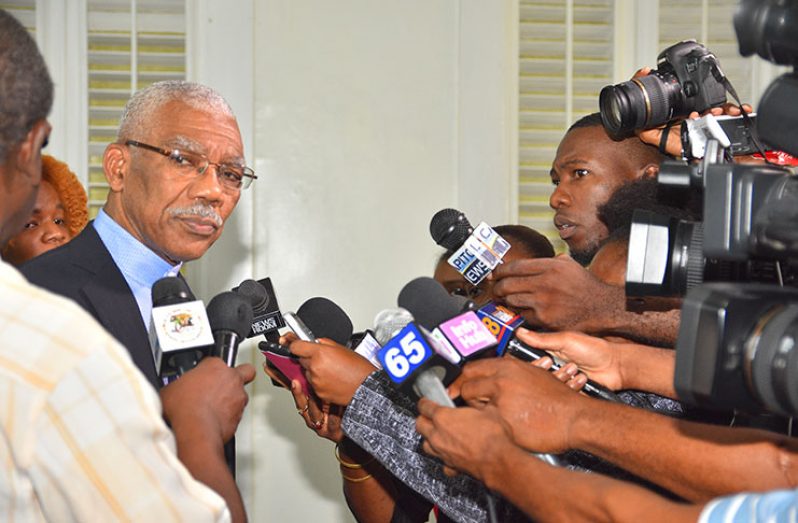–Says not constitutionally required to give reason for rejecting GECOM nominees
PRESIDENT Granger is holding fast to his position, that constitutionally, he is not mandated to justify his decision to reject the Opposition Leader’s nominees for the Chairmanship of the Guyana Elections Commission (GECOM).
Last Thursday, he appointed retired high court judge, Justice James Patterson Chairman of GECOM after informing Opposition Leader Bharrat Jagdeo that his third list, like the first two, was unacceptable.
The President’s decision has attracted much criticism, with the Guyana Bar Association calling for him to give reason for the rejection of the 18 names submitted to him by the Opposition Leader.
But President Granger is maintaining that he is not constitutionally required to give reason. “I do not know that that requirement is enshrined in the Constitution,” he told reporters on the sidelines of the swearing-in of the eight members of the Local Government Commission at State House on Monday.
“Guyana is a small country, and we have to be very careful about these judgments about persons’ character and their capabilities. I have to be advised,” he said.
Acknowledging that the Chief Justice, Ms Roxanne George-Wiltshire has ruled on the matter, the President said he has no intention of acting in the contrary.
“I know the Chief Justice has made certain statements, and I intend not to contradict the Chief Justice,” he said, “but I have not been advised that is a requirement which is enforceable. I don’t know if that is enforceable.”
In the matter of Marcel Gaskin vs the Attorney General, the Chief Justice, in her ruling, has advised that there is no legal requirement for the President to state reasons for rejecting a list, though it is her belief that in the furtherance of democracy and good governance, he should, since Article 161 (2) speaks to the need for dialogue and compromise.
The Guyana Human Rights Association (GHRA) is among organisations that have also expressed concern about what they deem the arbitrary selection of Justice Patterson. GHRA, in a statement on Saturday, went one step further in that they are questioning Justice Patterson’s suitability for the post.

“He attracted public notice for his involvement in the politically controversial Maurice Bishop murder trial in Grenada, and his record of public service, senior management or promotion of democratic standards and practices is unknown,” the organisation said, adding:
“This calls into question whether he is indeed a more ‘fit and proper person’ than many of those on the three lists submitted by the leader of the opposition.”
Article 121 (2) of the Constitution states that, “Subject to the provisions of Paragraph 4, the Chairman of the Elections Commission shall be a person who holds, or who has held, office as a judge of a court having unlimited jurisdiction in civil and criminal matters in some part of the Commonwealth or a court having jurisdiction in appeals from any such court, or who is qualified to be appointed as any such judge, or any other fit and proper person, to be appointed by the President from a list of six persons, not unacceptable to the President, submitted by the Leader of the Opposition after meaningful consultation with the non-governmental political parties represented in the National Assembly.”
In is defense, the President sought to remind his detractors that Justice Patterson was a High Court Judge. “He was a judge of the high court in Guyana,” he said, adding: “The information I have is that he was Chief Justice of Grenada. His curriculum vitae is not a secret; you can examine it for yourself. He was a judge in Guyana, that’s important.
“I was asked by the Leader of the Opposition to suggest certain criteria which were not necessarily incorporated in the Constitution, and I proposed certain criteria.”
While significant attention is being placed on the end result of the negotiation between he and the Opposition Leader, President Granger urged that the matter be analysed holistically.
“Do not judge what occurred in the actual conclusion of the negotiations with the Leader of the Opposition as the totality.” He said.
“This process started a year ago when the People’s Progressive Party started to hound Dr. Surujbally out of office. They protested, picketed, and they drove him out of office. “This process has been dragged on for an entire year, and the people of this country demand; the people of this country deserve; the people of this country need to have a functioning Elections Commission.”
He reiterated that at all material times, he has acted within the Constitution.



.jpg)









